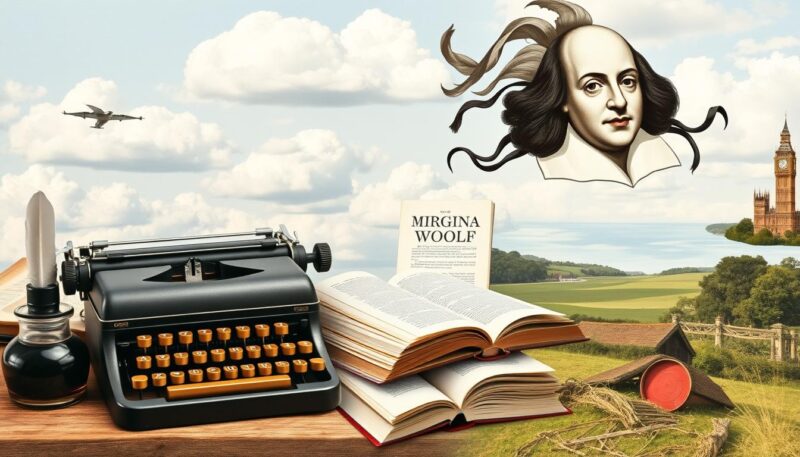Throughout history, the British Isles have produced some of the greatest English writers, whose works continue to resonate with audiences today. These literary giants, from the timeless plays of William Shakespeare to the profound narratives of Virginia Woolf, have shaped the landscape of English literature classics. Understanding what sets them apart involves examining their influence on literature and society, the themes they explored, and the enduring relevance of their characters.
In this exploration, you will delve into the criteria that designate these authors as top English authors. Their impact on the literary world, the number of copies sold, and their cultural significance are some of the key elements that define their greatness. Through the eras, the evolution of storytelling has led to groundbreaking changes in narrative styles and themes, making each author a unique contributor to English literature.
As we journey through this rich literary tradition, you will discover why names like Geoffrey Chaucer and Jane Austen have become synonymous with literary excellence. Their unique voices and perspectives not only reflect the time in which they wrote but also challenge the norms and expectations of their respective eras. The works of famous authors from centuries past have paved the way for future writers and have become foundational texts in the canon of English literature.
By immersing yourself in this exploration of the greatest English writers, you will gain a deeper appreciation for the power of literature and its ability to challenge, inspire, and transform. Are you ready to embark on this literary journey, tracing the steps of those who have left an indelible mark on English prose and poetry?
Shakespeare’s Legacy and Influence
William Shakespeare’s legacy remains a cornerstone of English literature, influencing authors and storytellers across generations. His work encapsulates the essence of storytelling through drama, poetry, and intricate character development. Mastering the complexities of human emotion, Shakespeare’s influence is felt not only in literature but also in modern culture, making him one of the best English writers in history.
The Impact of Shakespeare on English Literature
Shakespeare’s impact on English literature is both profound and expansive. He is credited with enriching the English language, introducing over 1,700 words and expressions still in use today. His ability to blend poetry and prose influenced later writers, unifying verse, poetry, and drama. Iconic literary works, including Macbeth and Hamlet, have set high standards for storytelling, shaping subsequent genres and inspiring countless adaptations in theatre and film.
Iconic Works of William Shakespeare
Among Shakespeare’s most celebrated plays are A Midsummer Night’s Dream, Romeo and Juliet, and King Lear, which have become staples of the theatrical canon. The top 10 most popular Shakespeare plays performed worldwide since 1992 showcase his ability to captivate audiences across time and culture:
| Play Title | Year Written | Genre |
|---|---|---|
| A Midsummer Night’s Dream | 1595 | Comedy |
| Hamlet | 1601 | Tragedy |
| Romeo and Juliet | 1597 | Tragedy |
| Macbeth | 1606 | Tragedy |
| Twelfth Night | 1601 | Comedy |
| As You Like It | 1599 | Comedy |
| Much Ado About Nothing | 1598 | Comedy |
| The Tempest | 1611 | Drama |
| The Comedy of Errors | 1594 | Comedy |
| Julius Caesar | 1599 | Tragedy |
Shakespeare’s Characters and Their Enduring Relevance
Shakespeare’s characters delve into complex human emotions and societal issues, providing a reflection of human nature. The roles of Othello and Lady Macbeth explore themes of jealousy and ambition, resonating deeply within audiences today. His characters’ psychological depth and moral dilemmas continue to inspire modern narratives, ensuring Shakespeare’s influence persists in contemporary storytelling.
Journey Through the Greatest English Writers
This section unfolds the contributions of pivotal literary figures who have shaped the course of literary history. Their narratives reflect societal values and explore deep human emotions, offering a rich tapestry of insights and inspirations. Each writer serves as a beacon, guiding readers through the landscape of famous English novels and literary masterpieces.
Geoffrey Chaucer: The Father of English Literature
Geoffrey Chaucer occupies a vital position in the realm of notable authors in history. His work, *The Canterbury Tales*, represents a groundbreaking approach to narrative poetry, showcasing a diverse cast of characters. This collection not only offers a glimpse into medieval society but also establishes him as a cornerstone of English literature.
Jane Austen: The Novelist of Social Commentary
Jane Austen is celebrated for her keen observations on society, particularly in her famous English novels such as *Pride and Prejudice* and *Emma*. These creative works resonate with readers today, reflecting timeless themes of love, class, and family dynamics. Austen’s ability to weave social commentary into relatable stories cements her status among the literary masterpieces of her time.
Charles Dickens and the Social Issues of His Time
Charles Dickens’ narratives are deeply intertwined with the social issues of his era. Through works like *Oliver Twist* and *Great Expectations*, he highlights the struggles of the impoverished and critiques societal structures. Dickens not only captures the essence of his time but also invites readers to empathize with the plight of his characters, solidifying his influence in literary history.
Virginia Woolf: Modernist Innovations in Narrative
Virginia Woolf stands out for her innovative narrative techniques, particularly her use of stream-of-consciousness. In masterpieces like *Mrs. Dalloway* and *To the Lighthouse*, she explores themes of perception, consciousness, and the complexities of human relationships. Woolf’s contributions have redefined the boundaries of storytelling, making her an integral figure in the discussion of notable authors in history.

Greatest English Writers of All Time
The timeline of English literature reveals a rich trove of influential authors spanning from the 18th to the 20th century. These historical authors crafted literary masterpieces that not only captivated their contemporaries but also left a lasting influence on society and future writers. By examining their major works and the themes they explored, one can appreciate how these British writers reshaped the literary landscape.
Influential Authors from the 18th to 20th Century
From the dawn of the 18th century, influential authors emerged, each contributing uniquely to the narrative of English literature. Jane Austen, celebrated for her keen social insights, penned enduring novels such as Pride and Prejudice. William Blake seamlessly blended poetry and art, securing a position among the elite of English writers. The works of Charles Dickens exposed social injustices and have become essential readings in English literature.
Literary Masterpieces That Shaped English Literature
Throughout centuries, various literary masterpieces have contributed significantly to the evolution of English literature. John Milton’s Paradise Lost stands as a landmark in epic poetry, while Mary Shelley’s Frankenstein introduced fundamental elements of science fiction. The Brontë sisters, with their profound explorations of love and independence in works like Jane Eyre and Wuthering Heights, continue to resonate with audiences today.
Notable Authors and Their Contributions
This rich tradition of British writers includes notable figures such as Virginia Woolf, who pioneered innovative literary techniques and examined themes of identity and privilege. Samuel Taylor Coleridge and John Donne brought vibrant creativity to poetry, while George Orwell’s timeless allegories like Animal Farm remain critical in contemporary discourse. These historical authors not only enriched English literature but also helped shape societal reflections through their compelling narratives.

Conclusion
Reflecting on the remarkable journey through the greatest English writers, it becomes clear that their collective legacies have profoundly shaped literary history. From the epic tales of Old English literature to the intricately woven stories of the modern era, each notable author has contributed to a tapestry rich with diverse voices and perspectives. Writers like William Shakespeare, whose influence pervades every corner of English literature, have not only set the stage for future generations but continue to resonate with readers today.
The importance of these literary giants cannot be overstated; they have paved the way for contemporary storytelling and themes that remain relevant in our world. The rich contributions from authors across centuries—from Geoffrey Chaucer to Virginia Woolf—demonstrate a dynamic evolution in narrative style and thematic depth that has defined what literature means to us. Their works not only reflect the complexities of human experience but also inspire you to explore further, to seek meaning and connection in words, regardless of the time in which they were written.
As you delve into the writings of these greatest English writers, you uncover not only historical context but also a continued relevance that bridges the past and the present. Their masterpieces encourage an appreciation of the literary landscape, inviting you to engage with the stories and characters that have left an indelible mark on our collective consciousness. In the end, the legacy of these notable authors propels the narrative of literary history forward, making the pursuit of literature a rewarding and enriching journey for all.
